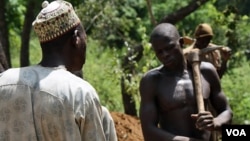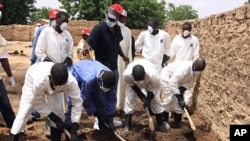ZAMFARA STATE, NIGERIA —
Since the price of gold spiked a few years ago, residents of Zamfara State in northern Nigeria have been digging homemade mines in and around their villages. Officials blame these unregulated operations for a lead poisoning outbreak that has killed hundreds of children, but activists say punishing miners will only deepen the health crisis.
Sani Bila, the head of a local miners association, squats on top of a pile of rocks as men shovel in nearby shallow pits. He picks up two rocks: one that contains gold ore and one without. The gold rock is much heavier.
Bila says gold mining in this region has exploded in recent years.
"They used to sell gold for less than $10 a gram but now they get about $30," he said. "As a result, a lot more people are mining, and a lot fewer are struggling to survive on a dollar or two a day, which used to be the average income around here."
Officials say this mining boom has also caused what activists say is the worst lead poisoning outbreak in history, with thousands of children severely infected. Gold in Zamfara is found in rocks that when crushed produce lead dust that sticks to the miners' clothes and bodies.
Thousands of children have been treated for severe lead poisoning. Thousands more have been exposed in a nearby village where a massive clean up has yet to commence, despite government promises.
At a conference in the capital, Abuja, State Minister of Health Muhammad Ali Pate says to prevent future lead poisoning, the government needs to stop illegal small-time mining.
“People do illegal mining and bring their mining products home and process it. Inadvertently, they poison their environment with lead which ends up in their children," said Pate.
No one disputes that much of the mining is technically illegal, with bans in place, and that miners don’t own the titles to their mines.
But still, the work continues. Local officials openly delay enforcing bans and Nigeria’s Doctors Without Borders head Ivan Gayton says most miners don’t even know they are supposed to have titles.
“The villagers, having been in this area for thousands of years, and thinking it quite normal that whatever is beneath the ground in their own villages is available for them for whatever they chose to do with it. In fact they’re not even aware that in 2007 the federal government allocated these resources to mostly mineral speculators. Mostly people who don’t even have any connection to Zamfara State," said Gayton.
International corporations are already eyeing the gold and mining leaders fear that without legal status, the locals could be pushed out. But, they say, if they can organize, they may be able to collectively buy back the titles to some of the minerals before it's too late.
In the meantime, Gayton says the threat of losing their businesses is already making Zamfara’s health crisis worse.
Miners often don’t invest in safer equipment, he says, because they know they can be shut down any day. Parents are also afraid to report lead poisoning because if the bans are enforced, it would crush their local economies, leaving their children without enough food or healthcare.
This mine, like most in the region, is deep in the bush.
Hassan Haruna, the secretary of the local mining association, says miners know their operation is illegal, but they went to the state capital, Gusau, for help and still have no license.
"They told us to form an organization and we did that. We formed an organization. We went to Gusau and got our certificate for the mining. But the only thing is the license. We don’t know where to find the license," said Haruna.
Haruna says they won't stop mining, despite lead poisoning and legal difficulties. They are trying to teach miners how to keep lead out of their homes, he says, and Zamfara’s children need money to eat.
Sani Bila, the head of a local miners association, squats on top of a pile of rocks as men shovel in nearby shallow pits. He picks up two rocks: one that contains gold ore and one without. The gold rock is much heavier.
Bila says gold mining in this region has exploded in recent years.
"They used to sell gold for less than $10 a gram but now they get about $30," he said. "As a result, a lot more people are mining, and a lot fewer are struggling to survive on a dollar or two a day, which used to be the average income around here."
Officials say this mining boom has also caused what activists say is the worst lead poisoning outbreak in history, with thousands of children severely infected. Gold in Zamfara is found in rocks that when crushed produce lead dust that sticks to the miners' clothes and bodies.
Thousands of children have been treated for severe lead poisoning. Thousands more have been exposed in a nearby village where a massive clean up has yet to commence, despite government promises.
At a conference in the capital, Abuja, State Minister of Health Muhammad Ali Pate says to prevent future lead poisoning, the government needs to stop illegal small-time mining.
“People do illegal mining and bring their mining products home and process it. Inadvertently, they poison their environment with lead which ends up in their children," said Pate.
No one disputes that much of the mining is technically illegal, with bans in place, and that miners don’t own the titles to their mines.
But still, the work continues. Local officials openly delay enforcing bans and Nigeria’s Doctors Without Borders head Ivan Gayton says most miners don’t even know they are supposed to have titles.
“The villagers, having been in this area for thousands of years, and thinking it quite normal that whatever is beneath the ground in their own villages is available for them for whatever they chose to do with it. In fact they’re not even aware that in 2007 the federal government allocated these resources to mostly mineral speculators. Mostly people who don’t even have any connection to Zamfara State," said Gayton.
International corporations are already eyeing the gold and mining leaders fear that without legal status, the locals could be pushed out. But, they say, if they can organize, they may be able to collectively buy back the titles to some of the minerals before it's too late.
In the meantime, Gayton says the threat of losing their businesses is already making Zamfara’s health crisis worse.
Miners often don’t invest in safer equipment, he says, because they know they can be shut down any day. Parents are also afraid to report lead poisoning because if the bans are enforced, it would crush their local economies, leaving their children without enough food or healthcare.
This mine, like most in the region, is deep in the bush.
Hassan Haruna, the secretary of the local mining association, says miners know their operation is illegal, but they went to the state capital, Gusau, for help and still have no license.
"They told us to form an organization and we did that. We formed an organization. We went to Gusau and got our certificate for the mining. But the only thing is the license. We don’t know where to find the license," said Haruna.
Haruna says they won't stop mining, despite lead poisoning and legal difficulties. They are trying to teach miners how to keep lead out of their homes, he says, and Zamfara’s children need money to eat.






